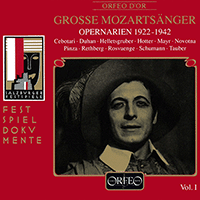Helge Rosvaenge
Helge Rosvaenge (full name Helge Anton Rosenvinge-Hansen) was largely self-taught as a singer, studying chemistry at the Copenhagen Technical College and initially making his career in this field. After marrying the Hungarian singer Ilonka Holndonner, however, he gave a duo recital with his wife at Schwerin in North Germany which was sufficiently successful for him to be invited to make his formal operatic stage in 1921 in Neustrelitz as Don José / Carmen. He then followed the traditional route of working his way up a chain of opera companies in Northern Europe: from 1922 to 1924 he was at Altenburg, from 1924 to 1926 at Basle and from 1926 to 1929 at Cologne.
In 1929 Rosvaenge was engaged as a member of the Berlin State Opera and remained there until the close of World War II, enjoying great popular, critical and political success throughout this period. He was very much a key figure within this company, singing a wide range of roles with considerable frequency. For instance he might sing within a single week Alfred / Die Fledermaus, Don José, Rodolfo / La Bohème and Bacchus / Ariadne auf Naxos.
At the Vienna State Opera Rosvaenge first appeared in 1927, again as Don José, becoming a member of this company in 1930. He also appeared with the Bavarian State Opera in Munich. He first sang at the Salzburg Festival in 1932 and returned there regularly: his roles included Huon / Oberon (1932–1933), Tamino / Die Zauberflöte (1932–1933, 1939), Florestan / Fidelio (1938), the Italian Singer/ Der Rosenkavalier (1938, 1949) and the Youth Apparition / Die Frau ohne Schatten (1932, 1933); in addition he sang often in concerts.
Having sung Radamès / Aida in Cairo in 1933 Rosvaenge undertook the title role in Parsifal at the Bayreuth Festival in 1934 and 1936, but otherwise avoided the Wagnerian repertoire, which undoubtedly assisted his vocal longevity. He appeared widely throughout Europe, singing in Amsterdam, Brussels, Copenhagen, Dresden, Hamburg, Milan and Stockholm; and sang Florestan at the Royal Opera House, London in 1938 under Beecham, making a positive critical impression with his ‘authority and tenseness’. He was also adept at operetta, for instance singing opposite Tiana Lemnitz in the first performance of Eduard Künneke’s Die grosse Sünderin at the Berlin State Opera in 1935.
Throughout World War II Rosvaenge remained very active in Germany, singing frequently in radio performances of opera and in concert, as well as in occupied territories (for instance appearing in 1941 as Belmonte / Die Entführung aus dem Serail at the Paris Opera). In 1945 he was deported to Russia, working after his release as a chemist in Spain with the intention of emigrating to South America. However his chief purpose in life was singing, to which he returned in 1949, initially recording for Decca in Switzerland.
Soon Rosvaenge was active once again in Vienna and Salzburg, singing regularly at the State Opera and Volksoper until 1959; and was presented with the Vienna State Opera’s Golden Ring, a signal honour, in 1951. He returned in 1955 to the Berlin State Opera, where he was made an honorary member of the company; and also appeared as a guest in Zürich and at the Bregenz Festival. As late as 1963 and 1964 he gave concerts in New York, evidently with very little loss of vocal quality; and after retiring from professional performance, he taught in Munich.
Throughout his career Rosvaenge possessed the ‘sappy’ type of tenor voice beloved throughout Northern Europe. His singing was undeniably exciting, and his range of roles, as evidenced by his numerous recordings, extraordinary. He was one of the most outstanding tenors active in Europe during the first half of the twentieth century, a fact obscured by his presence within the artistic apparatus of the Third Reich and by his singing almost exclusively in German.
© Naxos Rights International Ltd. — David Patmore (A–Z of Singers, Naxos 8.558097-100).

















